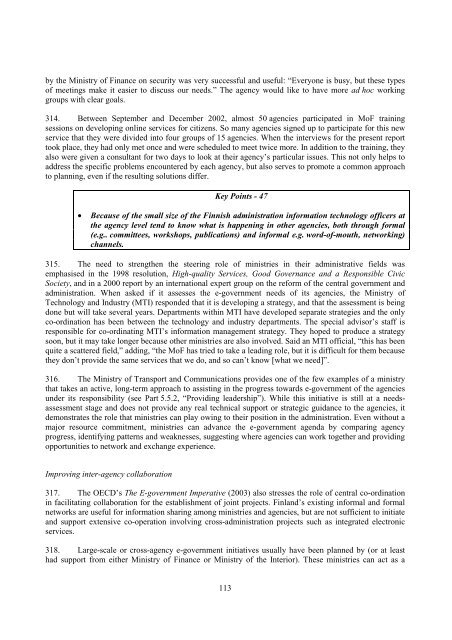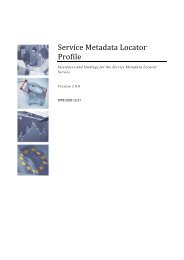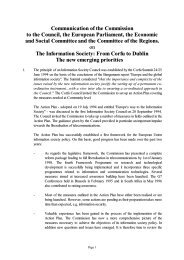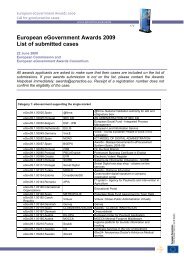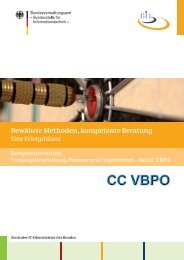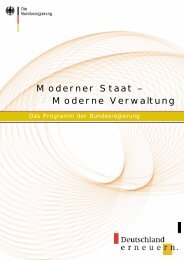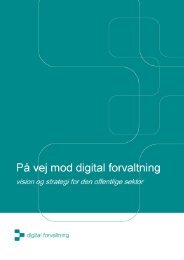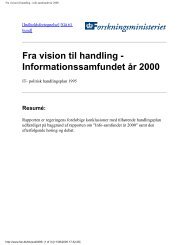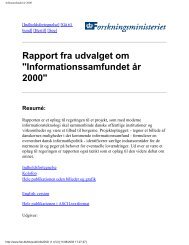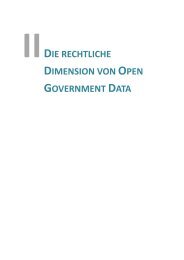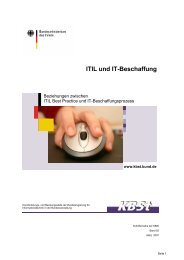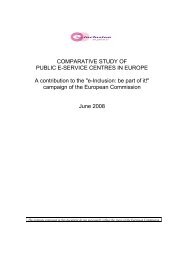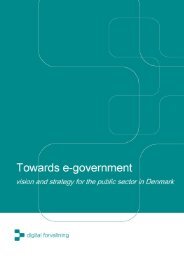e-GOVERNMENT IN FINLAND - ePractice.eu
e-GOVERNMENT IN FINLAND - ePractice.eu
e-GOVERNMENT IN FINLAND - ePractice.eu
Create successful ePaper yourself
Turn your PDF publications into a flip-book with our unique Google optimized e-Paper software.
y the Ministry of Finance on security was very successful and useful: “Everyone is busy, but these types<br />
of meetings make it easier to discuss our needs.” The agency would like to have more ad hoc working<br />
groups with clear goals.<br />
314. Between September and December 2002, almost 50 agencies participated in MoF training<br />
sessions on developing online services for citizens. So many agencies signed up to participate for this new<br />
service that they were divided into four groups of 15 agencies. When the interviews for the present report<br />
took place, they had only met once and were scheduled to meet twice more. In addition to the training, they<br />
also were given a consultant for two days to look at their agency’s particular issues. This not only helps to<br />
address the specific problems encountered by each agency, but also serves to promote a common approach<br />
to planning, even if the resulting solutions differ.<br />
Key Points - 47<br />
x Because of the small size of the Finnish administration information technology officers at<br />
the agency level tend to know what is happening in other agencies, both through formal<br />
(e.g.. committees, workshops, publications) and informal e.g. word-of-mouth, networking)<br />
channels.<br />
315. The need to strengthen the steering role of ministries in their administrative fields was<br />
emphasised in the 1998 resolution, High-quality Services, Good Governance and a Responsible Civic<br />
Society, and in a 2000 report by an international expert group on the reform of the central government and<br />
administration. When asked if it assesses the e-government needs of its agencies, the Ministry of<br />
Technology and Industry (MTI) responded that it is developing a strategy, and that the assessment is being<br />
done but will take several years. Departments within MTI have developed separate strategies and the only<br />
co-ordination has been between the technology and industry departments. The special advisor’s staff is<br />
responsible for co-ordinating MTI’s information management strategy. They hoped to produce a strategy<br />
soon, but it may take longer because other ministries are also involved. Said an MTI official, “this has been<br />
quite a scattered field,” adding, “the MoF has tried to take a leading role, but it is difficult for them because<br />
they don’t provide the same services that we do, and so can’t know [what we need]”.<br />
316. The Ministry of Transport and Communications provides one of the few examples of a ministry<br />
that takes an active, long-term approach to assisting in the progress towards e-government of the agencies<br />
under its responsibility (see Part 5.5.2, “Providing leadership”). While this initiative is still at a needsassessment<br />
stage and does not provide any real technical support or strategic guidance to the agencies, it<br />
demonstrates the role that ministries can play owing to their position in the administration. Even without a<br />
major resource commitment, ministries can advance the e-government agenda by comparing agency<br />
progress, identifying patterns and weaknesses, suggesting where agencies can work together and providing<br />
opportunities to network and exchange experience.<br />
Improving inter-agency collaboration<br />
317. The OECD’s The E-government Imperative (2003) also stresses the role of central co-ordination<br />
in facilitating collaboration for the establishment of joint projects. Finland’s existing informal and formal<br />
networks are useful for information sharing among ministries and agencies, but are not sufficient to initiate<br />
and support extensive co-operation involving cross-administration projects such as integrated electronic<br />
services.<br />
318. Large-scale or cross-agency e-government initiatives usually have been planned by (or at least<br />
had support from either Ministry of Finance or Ministry of the Interior). These ministries can act as a<br />
113


